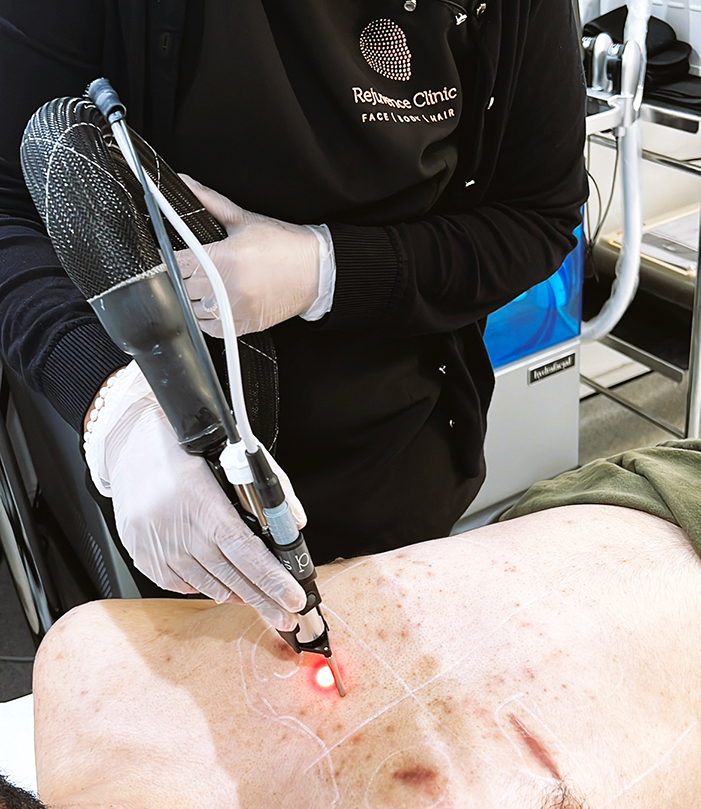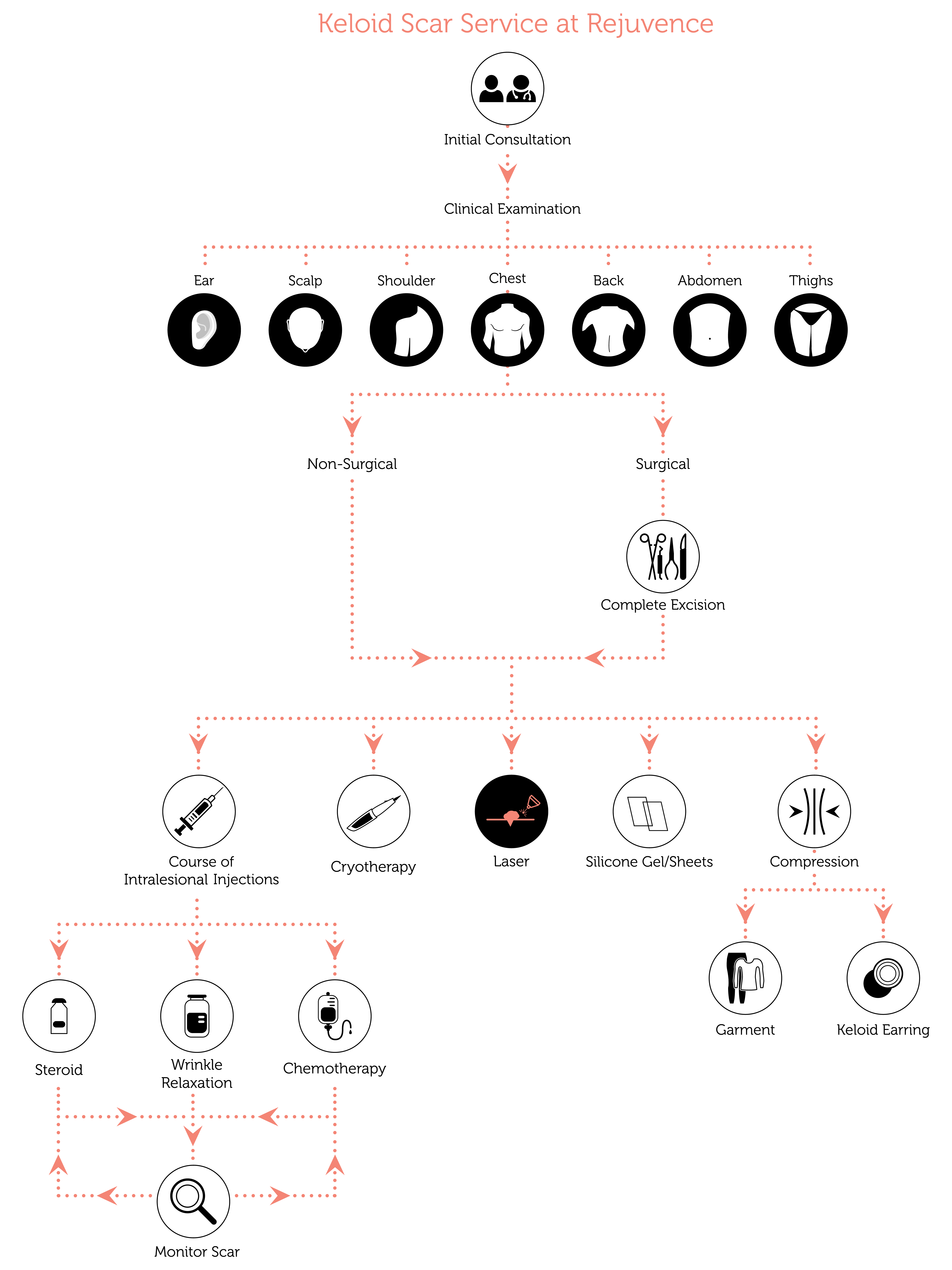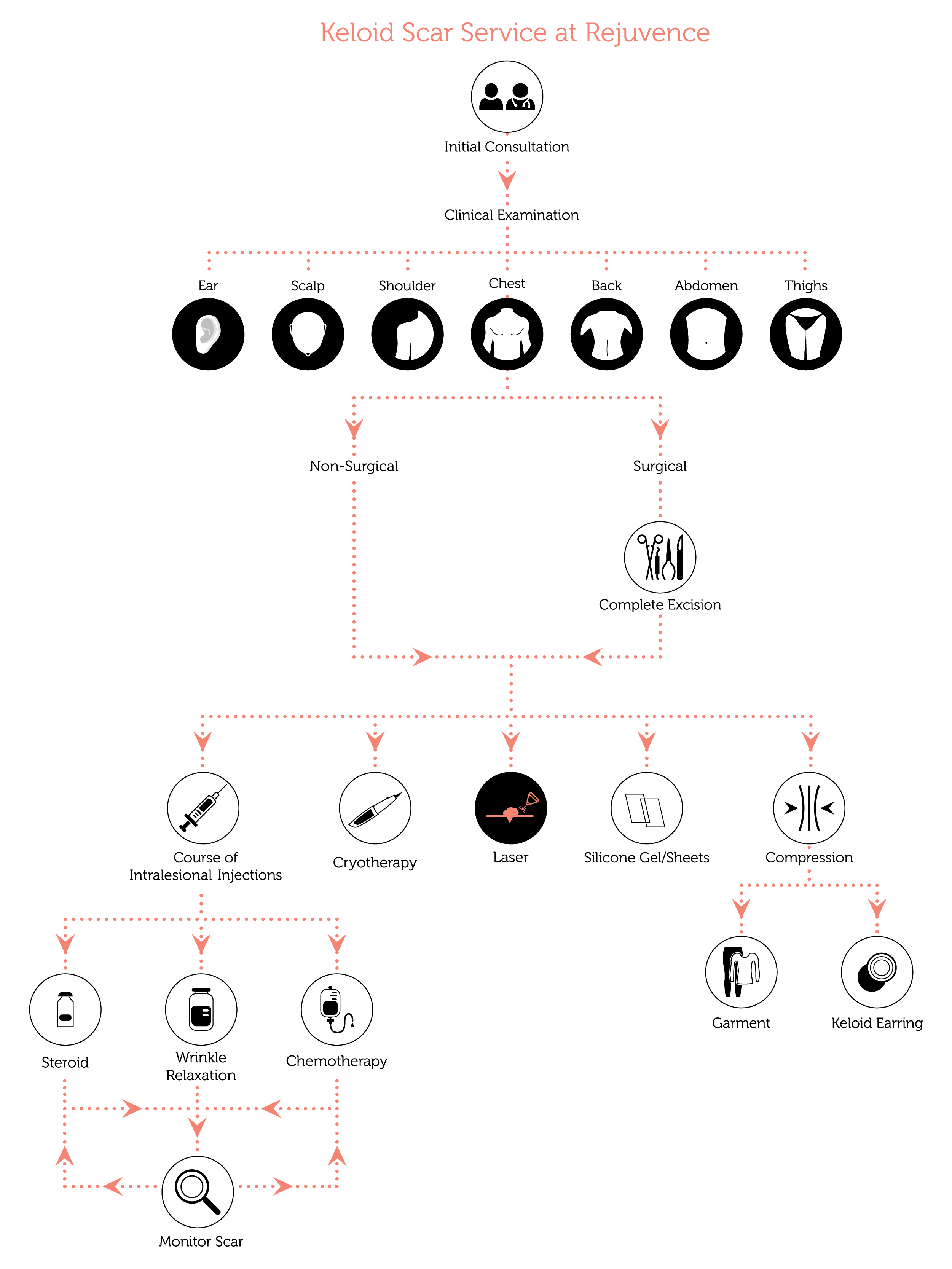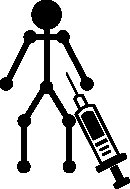Laser Treatment for Keloid & Hypertrophic Scars in London, UK

"World-Leading Laser Technology for Hypertrophic & Keloid Scars"
Combining advanced lasers with medical and surgical techniques to deliver meaningful, long-term improvements in even the most challenging scars.
Can laser treatment help with scarring?
Yes – laser treatment can greatly improve both hypertrophic and keloid scars. Nd:YAG lasers are especially effective for reducing scar thickness and firmness, and results are even better when combined with intralesional steroid injections. For surface smoothing, an Erb:YAG resurfacing laser can refine texture and blend the scar more naturally with surrounding skin. At Rejuvence Clinic, we use the Aerolase Neo Elite (Nd:YAG) and Aerolase Era Elite (Erb:YAG) for safe, targeted improvement.
We also use the BBL HEROic laser to treat residual redness and vascular flare, which are common after steroid treatment or during scar healing. BBL helps calm inflammation, reduce visible blood vessels and enhance the overall appearance of the scar. By combining these advanced technologies, we offer effective, multi-layered scar treatment for smoother, clearer skin.

What can lead to bad scarring?
The extent of scarring and quality of wound healing is dependent upon a number of factors. Skin type often affects the quality of healing. Darker skin types have a tendency to form darker scars and suffer from post-inflammatory hyperpigmentation. They also have an increased tendency to develop hypertrophic scarring (raised scars). In Afro-Caribbean and Asian skin types keloid scars (raised scars that extend beyond the site of injury) are a problem.
Wounds that are subject to infection or chronic inflammation can also result in the formation of displeasing scarring especially in conditions such as acne. Certain regions of the body tend to scar less and heal faster than others. The face tends to heal quickly but is the most visible part of the body. Hypertrophic and keloid scars tend to develop over the back, chest and torso more so than the face. Scars need to be stable with no evidence of inflammation or infection before any treatment can be effective in the improvement of their appearance.

What are keloid and hypertrophic scars?
Keloid scars and hypertrophic scars are the result of abnormal activity of cells called fibroblasts that result in the overproduction of collagen. These scars are associated with other symptoms including itching, pain, redness and psychological distress due to their appearance. They can also be red (erythematous) and directly impact quality of life. Keloid and hypertrophic scars are often found on parts of the skin that move quite a lot and are under significant skin tension.
How are hypertrophic and keloid scars treated?
Hypertrophic and keloid scars can prove very stubborn and difficult to treat. The best form of treatment is usually prevention in patients known to be susceptible. The use of compression garments and regular massaging with silicone gel can often help reduce the occurrence of hypertrophic and keloid scars soon after any operations or sustaining any injuries. These types of scars are often treated with injections of small amounts of steroids that can help to reduce them in size.


How does Nd:YAG laser help to treat keloid and hypertropic scars?
Nd:YAG laser has a wavelength of 1064 nm and is used in a variety of settings especially for laser hair removal. Nd:YAG laser is able to penetrate 4-5 mm and has fewer side effects than other lasers making it an excellent option for treatment of keloid and hypertrophic scars especially in combination with steroid injections and steroid tape.
Nd:YAG 1064nm laser works by specifically targeting melanin associated with hair follicles as well as haemoglobin in blood. The laser generates heat within the scar and results in a number effects on the scar. Generated heat results in destroying small blood vessels that helps to reduce redness associated with the scars.
The heat also helps to break down fibrous collagen resulting in new but reduced collagen formation that tends to be slightly more organised and less likely to form hypertrophic or keloid like scars. When combined with regular intralesional steroid injections and steroid tape, there can be a significant improvement in these types of scars.
As well as reducing the redness and size of keloid scars Nd:YAG laser has also been found to significantly help reduce pain associated with some scars. Numerous studies have shown that a series of treatment sessions can help reduce pain and itching especially when combined with other treatments such as intralesional steroid injections.
Aerolase Laser Treatment for Hypertrophic & Keloid Scars
At Rejuvence we offer a complete Keloid and Hypertrophic Scar Treatment service. We use the Aerolase Neo Elite and Aerolase Era Elite. Laser treatment with Aerolase is an excellent treatment option for keloid and hypertrophic scars.
Aerolase Neo Elite is a non-ablative Nd:YAG laser with a 650-microsecond pulse duration. This means it is possible to deliver high energies targeted at the deeper layers of the skin without damaging any of the adjacent skin and sift tissue. As a result it is safer and more effective overall, especially in skin of colour. This is especially important since keloid and hypertrophic scars are more prominent in darker skin types. The shorter pulse duration also means it is less painful and does not need cooling.
Aerolase Era Elite is an ablative Erb:YAG laser that has tremendous precision and control. In this regard it is safer than fraxel CO2 laser and suitable for skin of colour. The ablative Era Elite is often used towards the end of treatment programs to improve skin texture and tone as well as part of a ‘Reverse Neo Protocol’ for even better results.
Aerolase is extremely flexible and to optimse results we often combine their use with other treatment options including intralesional steroid and 5-FU injections, or complete surgical excision. Adjuvant treatments include silicone gel, silicone sheets, steroid sheets and compression garments. For further information on our keloid and hypertrophic scar service click here: Keloid & Hypertrophic Scars.
BBL HEROic for Redness & Vascular Components in Hypertrophic and Keloid Scars
BBL HEROic is a powerful broad-band light system that is highly effective for treating the redness and vascular activity seen in many hypertrophic and keloid scars. These scars often remain red due to increased superficial blood vessels and ongoing inflammation. BBL HEROic targets these vessels safely and precisely—especially in lighter skin types—reducing redness, calming inflammation and helping the scar appear flatter and less irritated.
BBL can also be combined with the Aerolase Neo Elite Nd:YAG for scars that have both superficial and deeper vascular components. BBL treats the vessels close to the skin’s surface, while Neo penetrates deeper into the scar to warm and remodel the tissue. This dual approach is particularly effective for stubborn or inflamed scars and helps prepare the scar for additional treatments such as steroid injections or resurfacing.
How BBL HEROic Differs From Nd:YAG and Er:YAG Lasers
BBL HEROic is a broad-band light device, not a laser. It covers a wider range of wavelengths, making it ideal for reducing redness, vascular flare and post-inflammatory hyperpigmentation (PIH) after surgery or trauma. It delivers energy gently, evenly and quickly across the skin, making it suitable for large areas and sensitive skin.
In contrast, the Nd:YAG laser (Aerolase Neo) operates at a single, deeper-penetrating wavelength, making it effective for thickened scar tissue, deeper blood vessels and inflammation often seen in hypertrophic or keloid scars.
The Er:YAG laser (Aerolase Era) is used for surface resurfacing, improving texture, smoothing raised edges and helping blend the scar more naturally into surrounding skin.
Together, these devices address the full spectrum of scar concerns—colour, depth, vascularity and surface texture.
Rejuvence Philosophy: A Combined, Multi-Layered Approach
At Rejuvence Clinic, we understand that no single device can treat all aspects of scarring. Hypertrophic and keloid scars involve multiple layers—redness, vascular activity, thickness, texture and pigmentation—which require a layered combination approach for the best results.
Our protocols integrate the strengths of each device: BBL HEROic to clear redness and surface vessels, Aerolase Neo to treat deeper vascular structures and soften scar tissue, and Aerolase Era to refine texture and improve skin smoothness. By sequencing these technologies safely and effectively, we create customised treatment plans that improve scar appearance, reduce symptoms and support long-term healing across all skin types.
This is the result of increased pigmentation at the site of a previous injury to the skin following healing. Post inflammatory hyperpigmentation can be treated with a combination of bleaching and blending with kojic acid and vitamin A. Depending upon the depth of the hyperpigmentation Chemical Peels can be used to improve hyperpigmentation following a period of stabilisation of skin health with a good skin care regime. Chemical Peels can also help to improve skin texture and tighten the skin. Hydrafacial with a specific emphasis on skin pigmentation can produce excellent improvements especially in the case of post inflammatory hyperpigmentation. The hydra facial device can also be used to treat pigmentation from scarring on other parts of the body.
Aerolase Neo Elite is excellent for post-inflammatory hyperpigmentation. The Aerolase Neo Elite delivers targeted energy to pigmented areas, breaking down the melanin that causes discoloration. Over time, these dark spots fade away, revealing a clearer and more even skin tone. This treatment is gentle enough for sensitive skin yet powerful enough to tackle stubborn pigmentation issues. Most importantly it is safe in all skin types especially skin of colour.
Hyperpigmentation is hugely variable in its presentation with respect to depth, intensity and the causative factors, this impacts the number of sessions needed and when to expect to see results. We would devise a bespoke, joint management plan at our initial consultation. As with melasma above, the lesion(s) typically darkens post treatment and eventually fades around 4 weeks.
Stable scars over regions of lacerations or following surgery are amenable to improvement with a number of treatment options. Any element of post inflammatory hyperpigmentation can be treated with bleaching products combined with vitamin A.
Scars can be improved by reactivating the healing process using micro needling. Angel Arethrex and Magellan Plasma injections into scars have demonstrated improvements in scar appearance following 3 to 4 sessions over a period of 3 to 4 months. More recently, the use of E50 Exosomes for the improvement in scar appearance in combination with Sylfirm X RF Microneedling can also significantly improve scar appearance.
In some cases however, surgical excision of the scar with re-stitching is necessary. This is normally limited to large substantial scars. A combination approach will provide the best results.
Early use of Aerolase Neo and Era Elite can significantly improve scars after surgery and are especially effective for the prevention of hypertrophic or keloid tendencies. The Nd:YAG laser can help improve the colour and contour of scars that develop following surgery. Scar revisions can also be treated with Nd:YAG to improve the red colour balance and any hypertrophic element especially if the healing process is complicated by infection and takes longer to resolve than expected. Era Elite has an ablative effect and help to smooth skin tone and ensure the scar feels flat and does not over grow.
We will initially arrange a consultation for you with our team of aesthetic doctors and laser technicians. The doctor and technician will examine your scars and carry out a patch test to ensure you do not have any side-effects from laser treatment. The treatment sessions are carried out every four weeks and the laser is usually run along the scar in three passes as long as these are tolerated by the patient. Topical anaesthetic is applied to the scars 30 minutes to an hour beforehand and the early use of intralesional steroid injections can be carried out at the same sitting.
The common side-effects of treatment include transient localised redness and transient oedema (swelling). These usually resolve within 2 to 3 days of treatment and we normally prescribe some steroid cream to be used straight afterwards.
